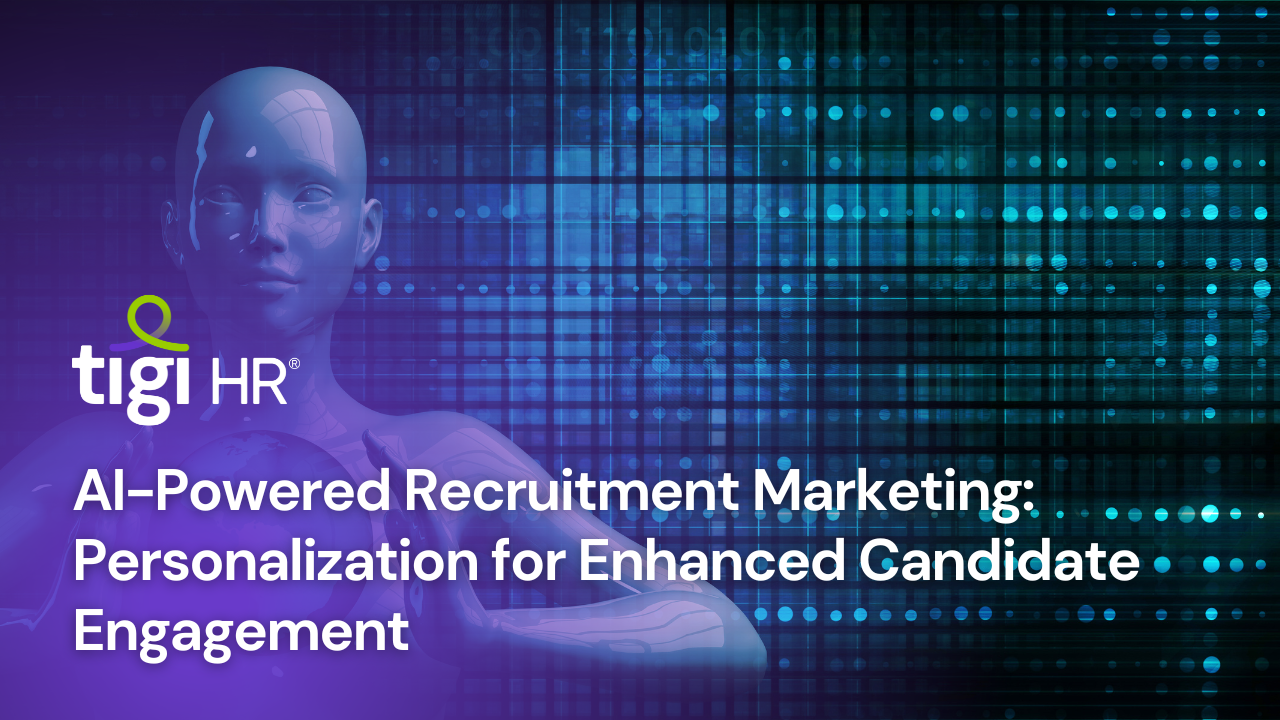Recruitment in the digital age has evolved far beyond posting job listings on career websites and waiting for applicants to pour in. Today, it’s about proactively attracting and engaging top talent through strategic recruitment marketing efforts. In this article, we explore the transformative role of Artificial Intelligence (AI) in recruitment marketing, particularly in enhancing candidate engagement through personalized experiences. We’ll delve into the importance of AI-powered recruitment marketing, its key benefits, and how organizations can leverage AI to create meaningful connections with candidates in an increasingly competitive job market.
The Candidate-Centric Paradigm
In an era where job seekers have more options than ever, organizations must adapt to a candidate-centric approach. It’s not just about evaluating candidates; it’s about making candidates feel valued and engaged throughout their journey, from the first touchpoint to onboarding and beyond.
Consider these statistics and insights that underscore the importance of a candidate-centric approach:
- According to a survey by Talent Board, 68% of candidates who have a positive experience with a company’s hiring process are more likely to apply for future job openings at that company.
- A study by LinkedIn found that candidates who have a positive experience are 38% more likely to accept a job offer.
- The Society for Human Resource Management (SHRM) reports that 86% of HR professionals believe that a poor candidate experience can negatively impact their employer brand.
- Deloitte’s 2021 Global Human Capital Trends survey reveals that 52% of respondents are focused on improving their candidate experience to attract and retain talent.
The Role of AI in Recruitment Marketing
AI has emerged as a game-changer in recruitment marketing, particularly in its ability to personalize interactions and deliver tailored experiences to candidates. Here’s how AI is reshaping the recruitment marketing landscape:
1. Personalized Content:
AI analyzes candidate data and behavior to deliver personalized content, such as job recommendations, blog posts, and company news, that aligns with the candidate’s interests and career aspirations.
2. Chatbots and Virtual Assistants:
AI-powered chatbots and virtual assistants engage candidates in real-time, answering questions, providing information, and guiding them through the application process.
3. Predictive Analytics:
AI leverages predictive analytics to identify high-potential candidates and tailor recruitment marketing efforts to attract and retain them.
4. Resume Screening:
AI algorithms can sift through resumes and applications to identify the most qualified candidates, saving recruiters time and ensuring that no promising candidates slip through the cracks.
5. Streamlined Communication:
AI streamlines communication with candidates, sending automated updates on their application status and providing feedback, even during high-volume recruitment periods.
Benefits of AI-Powered Recruitment Marketing
The adoption of AI in recruitment marketing offers numerous advantages for organizations seeking to enhance candidate engagement and build stronger talent pipelines:
- Personalization: AI allows organizations to deliver tailored content and experiences to candidates, making them feel valued and understood.
- Efficiency: Automated processes, such as resume screening and communication, free up recruiters to focus on more strategic tasks.
- Improved Quality of Hire: AI can help identify candidates who are the best fit for the organization’s culture and requirements, resulting in higher-quality hires.
- Competitive Advantage: Organizations that leverage AI are better equipped to attract and engage top talent in a highly competitive job market.
- Enhanced Employer Brand: Providing a positive and personalized candidate experience enhances an organization’s reputation as an employer of choice.
Implementing AI-Powered Recruitment Marketing
To harness the benefits of AI-powered recruitment marketing, organizations can follow these steps:
1. Data Collection and Analysis:
Start by gathering data on candidate interactions, preferences, and behaviors. This data serves as the foundation for personalization efforts.
2. AI Selection and Integration:
Choose AI tools and platforms that align with your recruitment marketing goals. Integrate AI seamlessly into your existing recruitment technology stack.
3. Personalization Strategy:
Develop a personalization strategy that outlines how AI will be used to engage candidates at different stages of the recruitment journey.
4. Content Creation:
Create personalized content, such as email templates, landing pages, and chatbot scripts, that resonates with candidates and aligns with your employer brand.
5. Candidate Journey Mapping:
Map out the candidate journey and identify touchpoints where AI can enhance engagement and provide value.
6. Test and Refine:
Continuously test and refine your AI-powered recruitment marketing efforts based on candidate feedback and performance metrics.
Real-World Examples of AI-Powered Recruitment Marketing
Several organizations have successfully integrated AI into their recruitment marketing strategies:
- IBM: IBM uses AI to personalize job recommendations for candidates, increasing the likelihood of finding the right fit for each role.
- Unilever: Unilever implemented an AI chatbot to engage with candidates and answer their questions, resulting in a 50% increase in candidate engagement.
Conclusion: Elevating Candidate Engagement with AI
In an increasingly competitive talent landscape, candidate engagement is a strategic imperative for organizations. The statistics and insights presented in this article emphasize the profound impact that a positive candidate experience can have on an organization’s employer brand and ability to attract top talent.
AI-powered recruitment marketing represents a paradigm shift in how organizations engage with candidates. By leveraging the capabilities of AI, organizations can create personalized and meaningful interactions that resonate with candidates, ultimately leading to higher-quality hires and a stronger talent pipeline. As the future of work continues to evolve, AI will play a pivotal role in shaping the candidate experience and driving recruitment success.
Also Check: Strategic Workforce Planning





